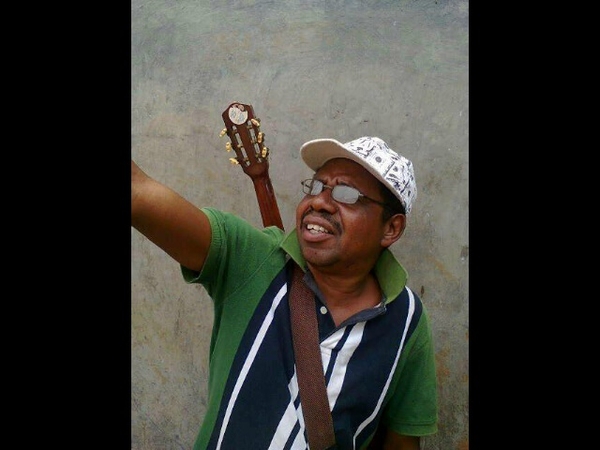
Solomon Ebhogadhe speaks to Amnesty about his hope that his father will be freed from death row and prison one day.
On 16 June 2013, ThankGod Ebhos was dragged to the gallows in Benin Prison, Nigeria. He was forced to watch as four men were hanged.
His life was spared only because at the last moment, the prison authorities realized that his death sentence required a firing squad. It had not been prepared.
The Nigerian furniture maker has been on death row for 17 years, convicted of armed robbery and sentenced to death by a special tribunal in 1995. Under the military government of the time, ThankGod was denied the right to appeal. He is currently appealing against his conviction on several grounds, including that his confession was obtained through torture and that his lawyer quit during the trial, leaving him with no one to represent him in court. ThankGod had been in prison since 1988.
His son, Solomon Ebhogadhe, only learned that his father was about to be put to death when he read a local newspaper report that four men had been hanged.
“The morning after the four executions I knew that my dad was on death row,” he told Amnesty International last year. “The article said there was still one person at risk of execution and I knew it was him. My two eldest sisters went down to the prison to try and find out what was happening.”
Tentative hope
One year on, ThankGod remains in prison but things are looking more positive. Speaking to Amnesty in March 2014, Solomon said that his father – whom he last saw in December 2013 – was doing well. He said that their mutual despair had given way to tentative hope for the future.
“When I stay with him,” said Solomon, “we both share our desires, which is to see that he is out of that place and that the government may show him mercy and give him another opportunity to do things right in society.”
Recent events suggest that this may be a possibility. In February 2014, the ECOWAS (Economic Community of West African States) Court of Justice ordered the governments of Edo state and Nigeria to remove ThankGod’s name from its list of death row inmates. The Nigerian federal government has already said it would respect the court order stopping the government from carrying out further executions. . At least, it seems that ThankGod has been temporarily reprieved from imminent execution.
Thousands on death row
More than 1,000 people remain on death row in Nigeria. The country carried out its first known judicial execution in seven years when it hanged four men in June 2013, making it one of just five countries in sub-Saharan Africa to execute that year. The executions took many by surprise – such was the secrecy surrounding them.
For Solomon, whose life has been so intimately affected by it, the death penalty is unacceptable. “It is not an eye for an eye or blood for blood,” he said. “There is nothing to say this is the one who should die and you are the one who will do the killing. This death penalty – it doesn’t sound reasonable, it doesn’t sound moral, it doesn’t sound like a thing that should come from the mouth of somebody who himself is not perfect.”
Plea for compassion
Today, Solomon looks forward to a time when his father can walk free again. “The goal is that my dad should be released, not just that he should not be executed,” said Solomon. “I know my dad is a man of great potential. He will come out of prison and he will be a plus to our country.”
He attributes this new-found hopefulness partly to Amnesty’s support for his father’s case. “Amnesty has done so much for me, my family,” he said. “Where [our message] has gotten to – we have no financial means to take that message that far. We would not have been able to speak and make the government hear. I am so grateful to Amnesty.”
In a heartfelt plea to the Nigerian government, he expressed his hope that they will give his father a second chance. “To my government, to the President, I want them to show compassion for my dad,” he said. “Let them be merciful, let them be sympathetic. I want them to walk with this idea that this man can be a better person in society again. Let them help me out, so my father can be free. So that as they are also fathers to children, I will also have a father. Please.”
Amnesty International continues to campaign for abolition of the death penalty and for criminal justice reforms to guarantee fair trials in Nigeria.

